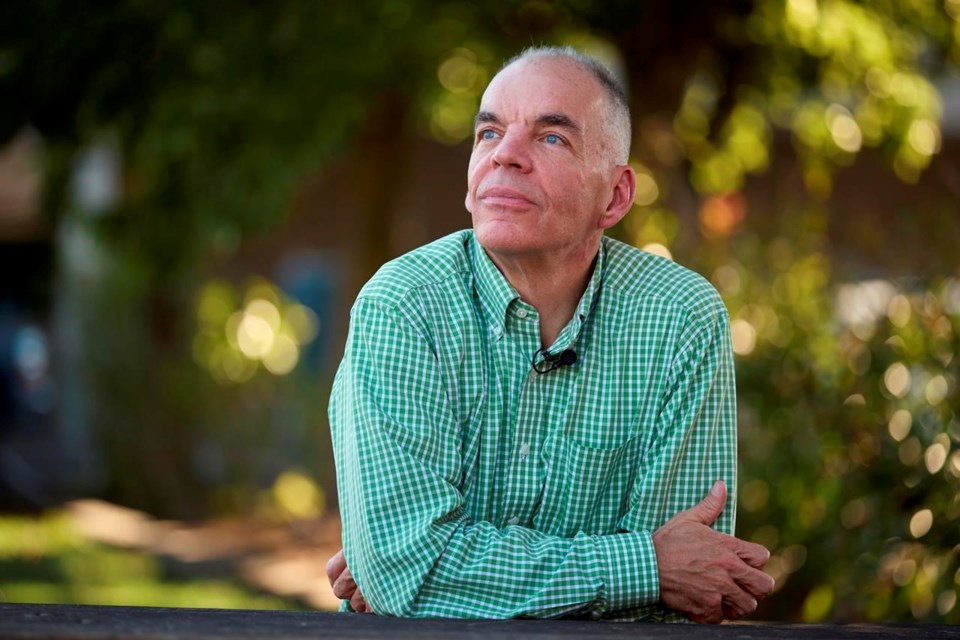SHELTON, Wash. (AP) — Sixteen candidates for local office circled around the atrium of the civic center on a recent night in a logging town near the southern crook of Puget Sound. One by one, they sat at tables of inquisitive voters for what was dubbed “candidate speed-dating.”
As Auditor Paddy McGuire, a Democrat, navigated the room, he was bombarded with questions from voters, some of whom have spent the past two years marinating in paranoia about the 2020 presidential election. Were there illegal immigrants on the county’s voting rolls? What surveillance was used to make sure the drop boxes where voters can deposit mail ballots are secure? Did he illegally delete election data?
One table ahead was Steve Duenkel, a Republican who is challenging McGuire for the office that oversees elections in Mason County, population 66,000. He told voters that mail-voting, which Washington state has used for decades, was inherently risky and that they couldn’t be certain of who actually wins the election next month until there was further verification, like an audit.
A veteran election official who put off retirement because of what he sees as the risk Duenkel’s challenge presents, McGuire is incredulous at the campaign against him.
“It’s just hard, as somebody who grew up, as I said, believing in democratic values, that I’m being challenged by somebody who doesn’t believe that our elections here, locally or nationally, are free and fair,” McGuire said. “Particularly here in Mason County, where his party wins a lot more elections than my party.”
Election conspiracy theorists such as Duenkel are running for Congress, governor and secretary of state positions in state after state. But an unknown number also are running for one of the estimated 10,000 positions nationwide that administer local elections and oversee the people who actually hand out ballots, tally votes and report results.
“You’re not going to know where the vulnerability will be,” said Democratic strategist Amanda Litman, whose group Run for Something has announced an $80 million effort over three years to back Democratic local election officials. “They can come from any direction, in any state.”
Conspiracy theorists who parrot former President Donald Trump’s lies about the 2020 election already have made inroads in local election administration. The most prominent example is in Colorado’s Mesa County, where Republican clerk Tina Peters faces felony charges for her role in an alleged illegal download of voting machines’ data — data that ended up on election conspiracy theory web sites.
Peters has pleaded not guilty to the charges. She’s not charged with the download and distribution of the data, which was not a crime in Colorado at the time. The Democratic Legislature made it one in a bill inspired by the case.
During the forum, McGuire warned that the number of Peters-like election deniers running in Washington may mean the Legislature needs to adopt a similar measure. Duenkel sponsored a local screening of a movie made by Trump supporters that portrays Peters as a heroic whistleblower.
Reached by phone before the forum, Duenkel told a reporter he was “busy” and hung up. He did not respond to text messages afterward.
An Olympia native, McGuire moved to Mason County from Washington, D.C., in 2014. He became Oregon’s deputy secretary of state in 2000 and helped the state become the first in the nation to send every voter a ballot in the mail. He went to Washington to help run the Pentagon’s mail voting program for overseas military personnel.
But in 2018, Mason County’s auditor retired, and asked McGuire to run for her post. He won with little controversy. Then came the pandemic and Trump’s reelection campaign. The president began to claim the election was being stolen. Citing the pandemic, McGuire limited the number of observers of the vote count and installed a video feed so people could watch remotely, but that didn’t satisfy his critics.
“Voting, to me, is one of the fundamental rights of an American citizen,” said Lindy Martinez, a retired cook. “If somebody is going to make it feel, like it is or isn’t, like you can’t see” how your vote is counted, she said, “then where’s my rights?”
Martinez joined a group headed by Duenkel that went knocking on doors to find examples of possible voter fraud. It claimed that it found hundreds of “anomalies” in the voter rolls. But McGuire said the vast majority of the cases the office knew about or were simply erroneous. A Seattle television station retraced the group’s steps and found numerous mistakes in its report.
At one of the first tables he sat at during the “speed-dating” event, voters challenged Duenkel about the television station’s report.
Duenkel repeatedly told voters he was not claiming “fraud.” But, at one table, after Duenkel described the purported “ghost voters” he said his door-knocking uncovered, Marisa Kaneshiro, a legal assistant, responded: “You just alleged fraud right here!”
McGuire faced pushback from voters, as well. At one of his initial tables, several voters asked about security on drop boxes — only one in the county has a video camera. McGuire argued that the existing sensors, like motion detectors, were as good as they could do right now. Minutes earlier, Duenkel had earned nods criticizing drop box security.
Outside the building, Barbara Weingarden, a 51-year-old dietary worker who described herself as politically “non-denominational,” said she was confused by Duenkel’s intimations of voter fraud.
“Steve was bringing that in from Seattle, or other metro areas,” she said, adding she was sure there was no cheating in her county. “We’re a small community.”
___
Associated Press coverage of democracy receives support from the William and Flora Hewlett Foundation. The AP is solely responsible for all content.
___
Follow AP’s coverage of the elections at: https://apnews.com/hub/2022-midterm-elections
Check out https://apnews.com/hub/explaining-the-elections to learn more about the issues and factors at play in the 2022 midterm elections.
Nicholas Riccardi, The Associated Press



